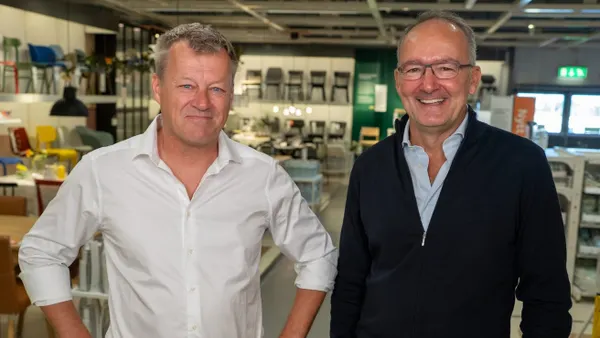Dive Brief:
- Guitar Center management has filed confidential registration papers for an initial public offering with the Securities and Exchange Commission, according to a report from Debtwire that cited anonymous sources.
- The filing follows increases in the retailer's sales as well as earnings, which have trended up both from last year and 2019 in the company's latest quarter, according to Debtwire data.
- The S-1 filing also comes less than a year after Guitar Center filed for bankruptcy under the weight of its debt load and pandemic disruption. The company did not immediately reply to a request for comment.
Dive Insight:
What a difference a year has made. In 2020, some 30 major retailers went bankrupt as the pandemic rippled through the industry and hit those companies with the biggest debt loads and weakest financial profiles.
So far in 2021, with sales recovering broadly and the stock market booming after last spring's sell-off, 12 companies in the retail space have filed to go public, either through an IPO or public listing.
Guitar Center has the distinction of being the only company on both of those lists.
The musical instrument retailer made a relatively quick trip through bankruptcy last year in a process that allowed it to shed hundreds of millions of dollars in debt while also raising new capital.
At the time, Guitar Center CEO Ron Japinga noted the "challenging times created by the pandemic" that led to its filing. But the company had been hobbled by debt for years after multiple private equity takeovers.
Guitar Center was originally founded by Wayne Mitchell in 1959 as an organ store located in Hollywood, California. After the Beatles helped solidify rock and roll's hold on the American music scene, "The Organ Center" ultimately became Guitar Center, focused on the in-store experience and building relationships with musicians.
In 2007, the retailer was taken over by Bain Capital in a leveraged buyout. Bain would go on to sell it to Ares Management, which held on to a stake after the company's Chapter 11, with Brigade Capital Management and The Carlyle Group also joining its ownership group.
According to one of the retailer's main rivals, a period of disinvestment in its stores, employees and inventory followed its private equity acquisition.
That rival, Chuck Surack, founder and chairman of online guitar seller Sweetwater, told Retail Dive last year that the music world needed Guitar Center and its stores.
"They're good for our industry, even though they're not as good as they used to be," Surack said last fall. "Our industry needs them badly. They need to inspire young people to come in and learn how to play an instrument."
On exiting bankruptcy in December, Japinga said that the process had given Guitar Center "the financial and operational flexibility we need to reinvest in our business and support our long-term sustainable growth."
Guitar Center's reported IPO filing is a sign that the company is in decent health, good enough at least that management believes it has something investors could be interested in. An IPO could also mean an influx of capital that could be used to reduce its remaining debt and to invest in its operations.
Correction: An earlier version of this article misstated Chuck Surack's title. Surack is the founder and chairman of Sweetwater.













